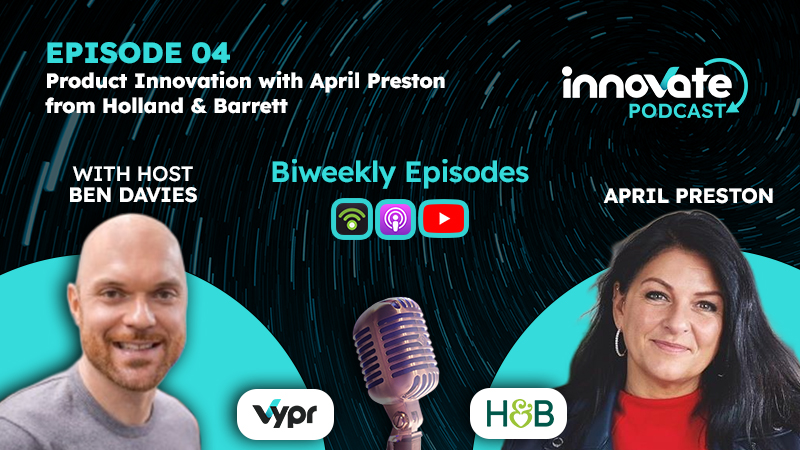Product innovation with April Preston – Innovate podcast

Product Innovation with April Preston from Holland & Barrett – Innovate Podcast
The Innovate Podcast is a biweekly series of discussions with CPG Innovation experts, on how to innovate with success in an ever-changing world.
In the fourth episode, our host Vypr Founder Ben Davies was joined by Holland & Barrett Global Product Director, April Preston.
Ben and April discussed innovation in the cost-of-living crisis, plant-based sector, and the importance of being focused on solving problems for consumers.
Listen to the full episode using the links below, and don’t forget to subscribe so you never miss an episode.
Listen on Podbean, Listen on iTunes or Watch on YouTube
Through the episode, April emphasised the importance of a focus on solving problems for consumers when conducting product innovation.
Read some highlights below.
Products that win solve problems for consumers
The products April has seen get to market are the ones that solve a problem for customers, and she believes this consumer-centricity is something the industry could do better when it comes to product innovation.
After all, the consumer is the one that decides whether products succeed or fail, and so designing products needs to be with this end user in mind.
“We’ve just got to keep the customer at the heart of what we do. You can’t go far wrong if you’ve got the customer at the heart of what you’re thinking of.”
But how can companies keep consumers at front of mind?
With the increased accessibility of technology, there are now multiple ways to keep pace with consumers via research platforms, such as Vypr, a specialised service for those delivering CPG products. By constantly touching base with consumers right from the initial stages of ideation, the chances of success are increased as companies can solve real problems and provide products people really want.
“I think we get too lost in product ideas and concepts and don’t really think enough about what problem we’re trying to solve here. All the best products I’ve seen get to market are solving a problem for customers, so we’ve got to get much more customer-centric”
The consumer voice can help with optimising product claims
April mentioned an example of consumer-centricity that can guide product innovation – namely when deciding what product claims to make, consumer research can help companies make the right decisions.
“The bit we need to get right is really understanding what are the motivating claims to make with customers. That’s exactly where Vypr would do a brilliant job for us because we can test a number of different things to talk about very quickly and come to the right conclusions.”
A consumer-centric, problem-focused approach can also help companies stay agile
Navigating the cost of living crisis by being problem-focused
Not only does consumer-centricity help product optimisation, it also better equips companies to adapt to a changing climate, such as the cost-of-living crisis affecting us now.
In this case, many companies would be tempted to hold back on innovation, but April suggested the importance of taking some risks if wanting to be successful at this time. This means conducting innovation, if it means solving problems for consumers.
“I think when a cost of living crisis hits the temptation is to slow down on innovation, but I think we need to do exactly the opposite and take a few more risks and try a few more things if we’re going to be successful.”
April also mentioned that behavioural changes depend on product categories. It’s important to understand consumer behaviour based on the category, instead of assuming a behavioural shift will affect every product in the same way.
“People still spend on luxury goods but they scale it down. I think it’s really understanding what categories will they [customers] still buy into and what are the alternatives”
One behaviour April noted is that people are now setting strict budgets – some are even asking cashiers to stop scanning items when they reach their budget. Success is found in discovering such behaviours and helping consumers, in this example, stick to budgets, and not in assuming what problems they need solving.
“What I’m starting to see already with the way customers are behaving is they’re setting themselves a monthly budget and they’re sticking to that. I think the secret to innovation will be really understanding how we can help customers stick to that budget, and not [just] the obvious let’s create a basics range”
Processes should also be focused on consumers
Not only the above, the way we innovate is also important, as a consumer-centric approach needs to be combined with a great methodology to make innovation successful.
April thought that the industry needs to bring more objectivity into the innovation process, incorporating the right data at the right points, and ultimately, bringing everything back to the consumer to ensure decisions are made to solve problems for them.
“Looking for ways to speed [process] up, to bring more objectivity into it rather than subjectivity, getting data at the right points and every step of the way bringing it back to the customer”
“It’s the wasteful money that’s spent because there’s too many iterations, too many stakeholders, sloppy decision-making – that’s what we’ve got to tighten up on.”
April also commented that many stakeholders can lead to too many opinions, reducing objectivity. By utilising technology to incorporate consumer voices, this can reduce this issue, and increase the speed of products getting to market. She emphasised the importance of a test-and-learn approach, and taking any setbacks as learning opportunities for growth.
“What we need to foster is quick-decision-making, that’s what takes the time and the money, and an iteration approach.”
“You’ve got to quickly learn and adapt, and you can’t beat people up when it isn’t successful first time because you’ve learnt something from doing that activity.”
—
All in all, by becoming more focused on solving problems for consumers, there is plenty of opportunity to learn and improve to transform the world of innovation, as we discovered in this episode.
Want to get all the insights? Listen to the full podcast on-demand. Click the links below to listen on your preferred platform.







